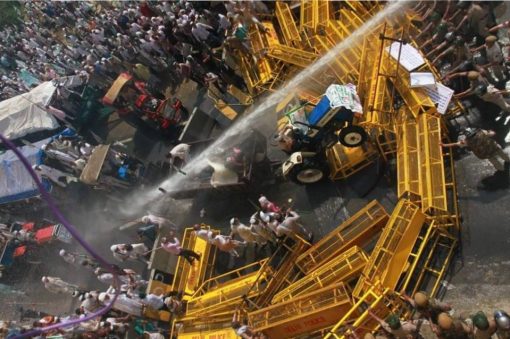Police Brutally Stop Farmer’s March To Delhi, Many Injured
October 3, 2018

Police used tear gas and water cannons to disperse a farmers march led
by Bhartiya Kisan Union (BKU) on the outskirts of Delhi. Many farmers
were injured. The protesting farmers are coming to the capital with
several demands including farm loan-waiver, friendly crop insurance and
support for small and marginal farmers and to implement recommendations
of the Swaminathan Commission. The police had earlier issued prohibitory
orders in east and north-east Delhi anticipating trouble.





The Kisan Kranti Yatra, which began from Tikait Ghat in Haridwar on
September 23, is the first of its kind by the BKU since the death of its
founder Mahendra Singh Tikait on May 15, 2011. The Tikait clan,
including the patriarch’s four sons, their wives, grandsons and their
children have also hit the streets along with others. The rally is an
echo of the massive protest of almost 5 lakh farmers spearheaded by BKU
founder Mahendra Singh Tikait at Delhi’s Boat Club in October 1988.

Earlier today, Home Minister Rajnath Singh held discussions with Union
Agriculture Minister Radha Mohan Singh and a few others on how to
resolve the farmers’ issues and pacify them. Union minister Gajendra
Singh Shekhawat also spoke to protesting farmers on the Delhi-UP border
and assured considering their demands.
Unsatisfied with government’s assurance to look into the matter,
Bharatiya Kisan Union president Naresh Tikait said the farmers will
continue with the protest until the demands are met.
Besides unconditional loan waiver, the farmers are protesting against
electricity and fuel prices which are shooting through the roof.
Bharatiya Kisan Union president Naresh Tikait on Tuesday said the
farmers will not accept govt assurance and will go ahead with the
protest.
Congress president Rahul Gandhi Tuesday accused the BJP of “brutally
beating up” farmers at the Delhi border on International Day of
Non-Violence and said that they cannot even air their grievances in the
national capital.
National Highways leading to the national capital were swamped with
farmers who came in from places as far as Gonda, Basti, and Gorakhpur in
eastern Uttar Pradesh as well as the sugarcane belt of western Uttar
Pradesh. Anticipating trouble, the police had imposed prohibitory orders
banning assembly of five or more people and holding of any public
meeting, usage of any amplifier, loudspeaker, and similar instruments.
On the top of their demand list is the implementation of the
Swaminathan Commission’s recommendations. The commission had submitted
five reports between 2004 to 2006 for “faster and more inclusive growth”
for farmers. The Commission observed that farmers needed to have an
assured access to and control over rightful basic resources. These basic
resources include land, water, bioresources, credit and insurance,
technology and knowledge management, and markets. It observed that
agriculture must be implemented in the concurrent list from the state
list — hence putting it as a matter of concern for both the Union and
the states. The reason farmers are demanding a full implementation of
the recommendations is that it would result in reasonable MSP and small
farmers would be secured.
Cut in diesel prices
The fuel prices in the country are on a record high with petrol
breaching the Rs 90/litre mark in Mumbai, while the diesel is priced at
Rs 78.69/litre today. The massive increase in petroleum and diesel
prices over the past few months have put an additional burden on the
farmers and has reduced the profit margin for them. A hike in the
electricity tariffs in Uttar Pradesh is another concern that the farmers
want the government to address. The farmers have also urged the
officials to provide uninterrupted power supply for at least six hours
during noon.
NGT ban on ten-year-old diesel vehicles
Farmers say the National Green Tribunal’s ban on diesel vehicles older
than ten years has hit them hard. Citing lack of funds to buy new
tractors and trucks, the farmers have called the green body to scrap
their order or provide them compensation. “We are not seeking any alms
from the government. We want our right,” said Harmik Singh, a farmer who
came from Meerut, reported PTI.
Loan waiver
Like the earlier Maharashtra’s farmer protest – Kisan Long March –
which demanded loan waiver, this group of farmers has also called for a
loan waiver. Farmers have been unable to repay because of crop failures,
droughts, floods, bumper crop or low MSP. This has put them under
additional distress, leading to many farmers committing suicide. The
protesters have called for a one-time complete loan waiver.
Payment of pending sugarcane dues
“First, we want the long promised Swaminathan Report to be implemented.
The increase in the prices of diesel, petrol and electricity have
completely crippled farmers. And now the government has also directed
that tractors older than 10 years have to be taken off the field. Where
are we supposed to get the money for new tractors? So many farmers have
not received payment for their sugarcane, which has been taken to the
sugar mills…,” said Ramesh Yadav (65), from Uttar Pradesh’s Kanpur
district. “There is a rage amongst us farmers. Why else would elderly
men like be out in the streets for so many days?”
The farmers have urged the government to expedite clearing the dues to
sugarcane farmers. In the 2017-18 agricultural year, India produced 32
million tonnes of sugar, while the demand was only 25 million tonnes,
leading to a crash in prices of sugar. As a result, the farmers have not
been able to clear their dues. The Uttar Pradesh government earlier
this month approved a Rs 5,535-crore package to help mills clear their
outstanding payment dues to growers, which are now almost at Rs 10,000
crore.

No comments:
Post a Comment